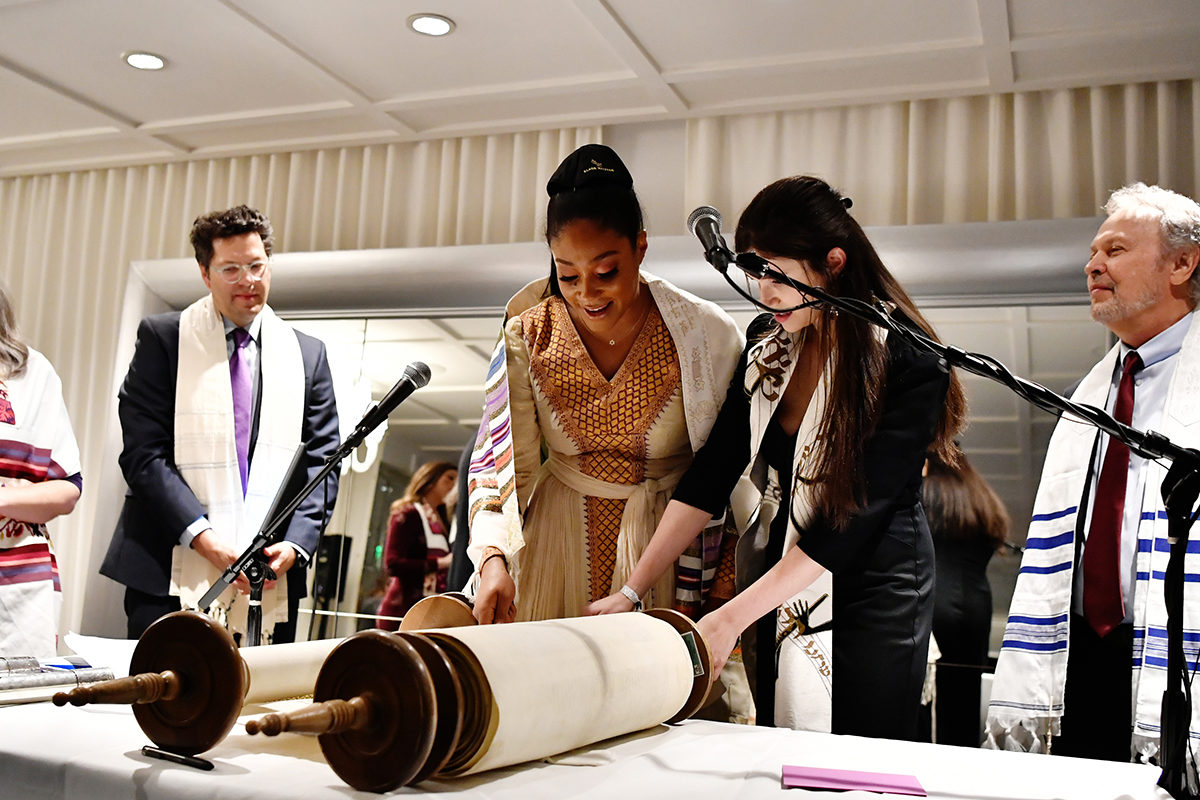Jewish life has given me so many joyful moments: coming out of the mikveh after my conversion, my fourth child’s simchat bat (Jewish naming ceremony), blessing our children on Friday nights after candle lighting. Along with the joy, though, are moments of sadness, self-doubt, and defensiveness, because I’m not just a Jewish woman. I’m a black Jewish woman.
I live in a mid-sized city in North Carolina with a small Jewish community. Generally, my family has been welcomed with open arms and hearts, and I know we are blessed to call our community home. Yet there are times, small and seemingly inconsequential when I’m reminded that as a POC, my Judaism can be questioned or ignored because I don’t “look Jewish.”
So when Tiffany Haddish — the unapologetically black comedian and actress, Tiffany Haddish — hosted an absolutely bonkers bat mitzvah for her 40th birthday last week, I was enthralled. I mean, let’s be real: Rabbi Susan Silverman, sister of Sarah Silverman, officiated. Billy Crystal had an aliyah. Custom kippahs proclaimed “Black Mitzvah.” Barbra Streisand attended! Bonkers, indeed.
Seeing the coverage in my social media feeds, I felt a little verklempt. Obviously, I was excited to see a dark-skinned woman being celebrated in the Jewish media, where often it feels the experience of being non-white or white-passing and Jewish in America is erased. As I watched Tiffany embrace her newfound Jewish identity so fearlessly, so publicly, so proudly, I, too, felt pride. She didn’t just proclaim her blackness and her Jewishness for herself, she proclaimed it for me, too.
As a Jewish POC, I’ve experienced microaggressions, even in my tight-knit community. My children and I are regularly confused with another interracial Jewish family in town, although we attend different synagogues and aren’t anything alike, other than being non-white. I’ve been questioned at services about how I learned to say “Shabbat Shalom,” or whether or not I’m lost or confused by what’s happening. People regularly assume my white spouse is the “Jewish one.” (Nope! He recently converted, but for years, it was me: the black one.)
These experiences weigh heavily on me, especially as I navigate nurturing dual identities in my children. I worry whether they’ll be “Jewish enough” to stand up to the questioning they’ll likely face when they leave home and enter Jewish spaces. I worry if they’ll be “black enough” to be accepted by other POC, even though they’re missing a huge cultural experience by not being “raised in the church.” Honestly, I worry whether I’m black enough, and Jewish enough, too.
I wish I had Tiffany’s confidence and self-assurance. She discovered that her biological father was a Jew and embraced her Jewish heritage, without worrying about how it would mesh with being black. Publicly, at least, there was never a question. She’s Tiffany Haddish — black, Jewish, and completely at home in her dark, Jewish skin. #GOALS.
However, if watching Tiffany proudly chant Torah, surrounded by so many loved ones, inspires me (of course it does!), it also terrifies me. In 2017, shortly after my conversion, I began studying for my bat mitzvah because it was the next logical step on my journey to becoming a “real” Jew. I lasted three months. Early in my studies, I announced my fourth pregnancy, and suddenly there were so many reasons to give up: I didn’t have the physical stamina. I didn’t have the mental energy. I didn’t have the time. And, since I’m going to keep it real: I didn’t have the self-confidence.
I am a mother of four children, one of whom is currently a surly tween. I volunteer at my temple, serving on multiple committees. I wrote a children’s book. I cook dinner (occasionally). So, yes, I’m crazy busy — yet I know that I have the skills to become an adult bat mitzvah. It’s the niggling doubt that’s holding me back. The small voice in the back of my mind, reminding me that in a room full of fellow American Jews, one of these things is not like the other: and that “thing” is me. How do I take this next, joyful step down my Jewish path as confidently as Tiffany Haddish?
A bat mitzvah takes months of preparation. I don’t exactly have an abundance of free time, because, as I may have mentioned, I have four kids. A bat mitzvah can be a lavish (read: expensive) affair. Unlike Tiffany Haddish, I don’t have an abundance of money, either. We’re just beginning to plan our eldest son’s bar mitzvah, with our second son’s bar mitzvah following closely behind. I dream of dollar signs flying out of my wallet.
The bare-bones truth is that I’m afraid. I’m afraid that my non-Jewish extended family won’t show up for me at this important moment, because some of them don’t exactly “get” becoming a bar or bat mitzvah. I’m afraid that they won’t understand that by standing on the bimah, receiving the Torah, chanting from it, and being blessed by my rabbis, I’m not just throwing myself a party. I’m publicly proclaiming my Judaism and my blackness.
I am black and I am Jewish — one identity cannot be separated from the other, because both inform my life experiences. I’m slightly out of place in mostly black spaces and also in mostly white Jewish spaces. The bit of discomfort I feel leads to self-reflection and growth. It leads to having ready responses when someone questions whether or not I’m “really” Jewish, or whether or not I’m “really” black, because although my skin is dark, my spouse and religious community are not.
But now I have someone I can look to for inspiration. What would Tiffany do? I already know: Tiffany would step up to the Torah, become bat mitzvah, and do it without fear and self-doubt. I know that in the future, maybe (probably) after my sons become b’nai mitzvah, I will stand proudly on the bimah, too — “Black Mitzvah” kippahs optional.








